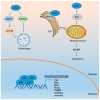Role of Autophagy and Apoptosis in Non-Small-Cell Lung Cancer
- PMID: 28208579
- PMCID: PMC5343902
- DOI: 10.3390/ijms18020367
Role of Autophagy and Apoptosis in Non-Small-Cell Lung Cancer
Abstract
Non-small-cell lung cancer (NSCLC) constitutes 85% of all lung cancers, and is the leading cause of cancer-related death worldwide. The poor prognosis and resistance to both radiation and chemotherapy warrant further investigation into the molecular mechanisms of NSCLC and the development of new, more efficacious therapeutics. The processes of autophagy and apoptosis, which induce degradation of proteins and organelles or cell death upon cellular stress, are crucial in the pathophysiology of NSCLC. The close interplay between autophagy and apoptosis through shared signaling pathways complicates our understanding of how NSCLC pathophysiology is regulated. The apoptotic effect of autophagy is controversial as both inhibitory and stimulatory effects have been reported in NSCLC. In addition, crosstalk of proteins regulating both autophagy and apoptosis exists. Here, we review the recent advances of the relationship between autophagy and apoptosis in NSCLC, aiming to provide few insights into the discovery of novel pathogenic factors and the development of new cancer therapeutics.
Keywords: apoptosis; autophagy; crosstalk; endoplasmic reticulum (ER) stress; mammalian target of rapamycin (mTOR); non-small-cell lung cancer (NSCLC); p53.
Conflict of interest statement
The authors declare no conflict of interest.
Figures



Similar articles
-
Cardiac glycosides induce autophagy in human non-small cell lung cancer cells through regulation of dual signaling pathways.Int J Biochem Cell Biol. 2012 Nov;44(11):1813-24. doi: 10.1016/j.biocel.2012.06.028. Epub 2012 Jun 27. Int J Biochem Cell Biol. 2012. PMID: 22750415
-
PDIA6 modulates apoptosis and autophagy of non-small cell lung cancer cells via the MAP4K1/JNK signaling pathway.EBioMedicine. 2019 Apr;42:311-325. doi: 10.1016/j.ebiom.2019.03.045. Epub 2019 Mar 25. EBioMedicine. 2019. PMID: 30922965 Free PMC article.
-
Erlotinib-induced autophagy in epidermal growth factor receptor mutated non-small cell lung cancer.Lung Cancer. 2013 Sep;81(3):354-361. doi: 10.1016/j.lungcan.2013.05.012. Epub 2013 Jun 13. Lung Cancer. 2013. PMID: 23769318
-
Autophagy-related signaling pathways in non-small cell lung cancer.Mol Cell Biochem. 2022 Feb;477(2):385-393. doi: 10.1007/s11010-021-04280-5. Epub 2021 Nov 10. Mol Cell Biochem. 2022. PMID: 34757567 Review.
-
Cancer-type-specific crosstalk between autophagy, necroptosis and apoptosis as a pharmacological target.Biochem Pharmacol. 2015 Mar 1;94(1):1-11. doi: 10.1016/j.bcp.2014.12.018. Epub 2015 Jan 3. Biochem Pharmacol. 2015. PMID: 25562745 Review.
Cited by
-
Emerging roles of circular RNAs in non‑small cell lung cancer (Review).Oncol Rep. 2021 Apr;45(4):17. doi: 10.3892/or.2021.7968. Epub 2021 Mar 2. Oncol Rep. 2021. PMID: 33649862 Free PMC article. Review.
-
Erlotinib Treatment in Colorectal Cancer Suppresses Autophagy Based on KRAS Mutation.Curr Issues Mol Biol. 2024 Jul 16;46(7):7530-7547. doi: 10.3390/cimb46070447. Curr Issues Mol Biol. 2024. PMID: 39057088 Free PMC article.
-
Identification of a apoptosis-related LncRNA signature to improve prognosis prediction and immunotherapy response in lung adenocarcinoma patients.Front Genet. 2022 Sep 12;13:946939. doi: 10.3389/fgene.2022.946939. eCollection 2022. Front Genet. 2022. PMID: 36171881 Free PMC article.
-
Exploring Amodiaquine's Repurposing Potential in Breast Cancer Treatment-Assessment of In-Vitro Efficacy & Mechanism of Action.Int J Mol Sci. 2022 Sep 28;23(19):11455. doi: 10.3390/ijms231911455. Int J Mol Sci. 2022. PMID: 36232751 Free PMC article.
-
Autophagy Function and Dysfunction: Potential Drugs as Anti-Cancer Therapy.Cancers (Basel). 2019 Sep 29;11(10):1465. doi: 10.3390/cancers11101465. Cancers (Basel). 2019. PMID: 31569540 Free PMC article. Review.
References
Publication types
MeSH terms
Substances
LinkOut - more resources
Full Text Sources
Other Literature Sources
Medical
Research Materials
Miscellaneous

